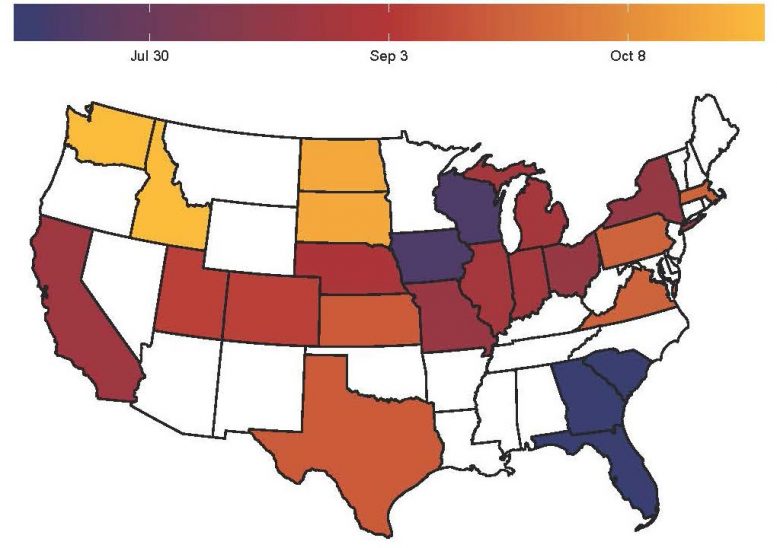
Map of the center of gravity of enterovirus D68 cases in the U.S. predicted by the pathogen extended resolution algorithm, from 2014-2019. This material relates to a paper that appeared in the March 10, 2021, issue of Science Translational Medicine, published by AAAS. The paper, by S.W. Park at Princeton University in Princeton, NJ; and colleagues was titled, “Epidemiological dynamics of enterovirus D68 in the US and implications for acute flaccid myelitis.” Credit: S.W. Park et al., Science Translational Medicine (2021)
Harnessing a predictive algorithm, Sang Woo Park and colleagues have mapped out new trends in the incidence of the respiratory virus enterovirus D68 in the U.S. since 2014. Their epidemiological study supports research that has linked enterovirus D68 to acute flaccid myelitis (AFM), a rare and mysterious paralyzing disease, and addresses critical gaps in knowledge of how enterovirus D68 has been spreading in the U.S.
The analysis also suggests that social distancing interventions during the COVID-19 pandemic likely lowered the prevalence of AFM in 2020.
Cases of the polio-like illness AFM, which rapidly results in limb weakness and lesions in the spinal cord, have been on the rise in the U.S. since 2012. The condition remains rare — affecting around 500 people in the U.S. annually — but researchers are concerned about its spread and are still unsure about what causes the disease.
One leading candidate is enterovirus D68, which has caused outbreaks of respiratory disease in North America, but surveillance data on this virus is sparse.
Here, Park et al. modeled the epidemiology of enterovirus D68 in the U.S. with data from the BioFire Syndromic Trends repository and compared nationwide enterovirus D68 prevalence to the actual incidence of reported AFM cases. Using a powerful algorithm, the team observed a strong correlation between enterovirus D68 and AFM: they predicted that enterovirus D68 peaked roughly every two years, with the peaks occurring directly before AFM epidemics in the autumn.
The researchers also predicted that moderate or large outbreaks of enterovirus D68 would have occurred under normal conditions in 2020, but that mask-wearing and other measures reduced the risk of outbreaks and likely contributed to the observed decline in cases of AFM.
Reference: “Epidemiological dynamics of enterovirus D68 in the US and implications for acute flaccid myelitis” by Sang Woo Park, Margarita Pons-Salort, Kevin Messacar, Camille Cook, Lindsay Meyers, Jeremy Farrar and Bryan T. Grenfell, 10 March 2021, Science Translational Medicine.
DOI: 10.1126/scitranslmed.abd2400









Be the first to comment on "Spread of Respiratory Virus Linked to a Rare and Mysterious Paralyzing Disease"